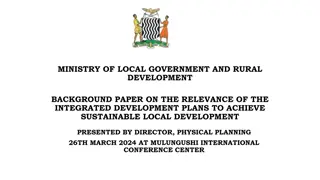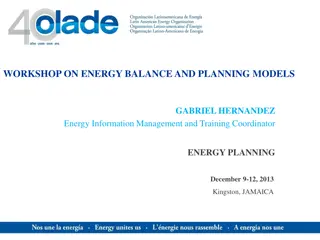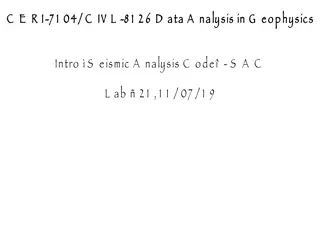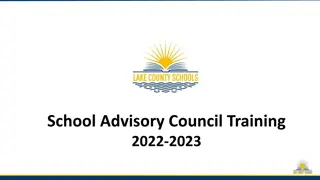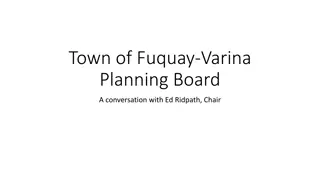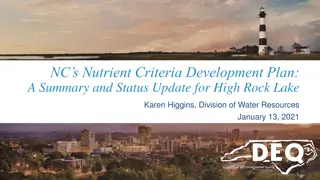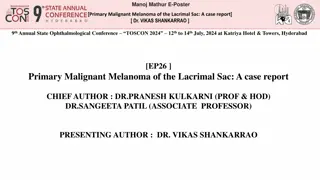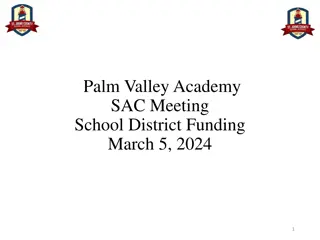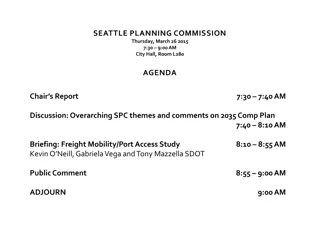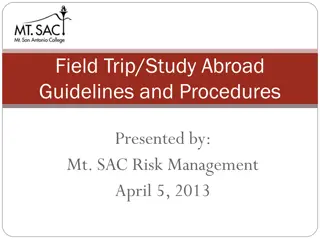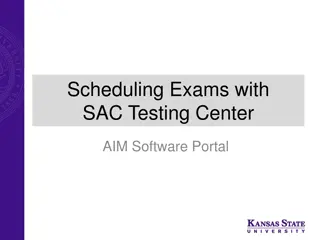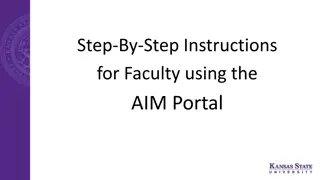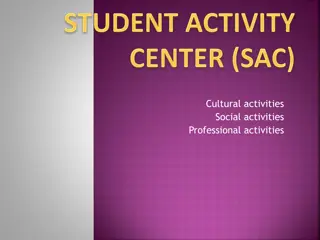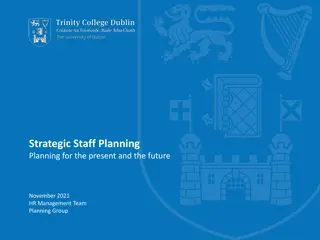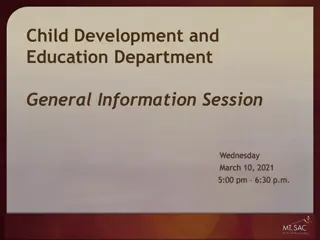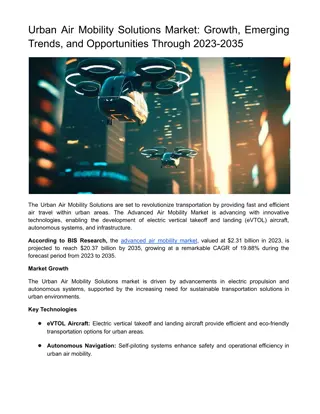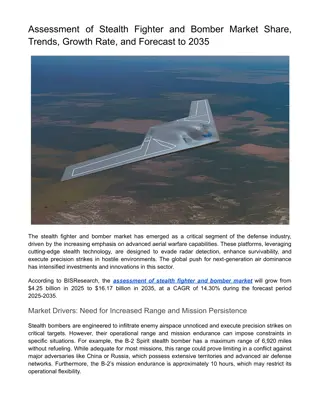Mt. SAC 2035 Integrated Planning for Future Success
Mt. SAC 2035 is a comprehensive plan aiming to serve students efficiently for the next 9-10 years. It assesses the college's mission accomplishment and guides the institution towards its goals. The plan emphasizes a shift towards a DEISA+ Healing Centered approach, focusing on student and community needs, instructional priorities, and inclusive planning principles. Through integrated planning processes and stakeholder engagement, Mt. SAC aspires to achieve continuous quality improvement and meet the demands of higher education effectively.
Download Presentation

Please find below an Image/Link to download the presentation.
The content on the website is provided AS IS for your information and personal use only. It may not be sold, licensed, or shared on other websites without obtaining consent from the author.If you encounter any issues during the download, it is possible that the publisher has removed the file from their server.
You are allowed to download the files provided on this website for personal or commercial use, subject to the condition that they are used lawfully. All files are the property of their respective owners.
The content on the website is provided AS IS for your information and personal use only. It may not be sold, licensed, or shared on other websites without obtaining consent from the author.
E N D
Presentation Transcript
Mt. SAC 2035 Lianne Greenlee October 9, 2024
Agenda What is Mt. SAC 2035? Integrated Planning How does it relate to IEC? Mt. SAC 2035 Timeline
BP 3250 Institutional Planning Mt. SAC 2035 is the College s broad-based, long-range Education & Facilities Comprehensive Plan. Assesses accomplishment of the Mission The blueprint for how best to serve our students for the next 9-10 years.
Context Since completion of Mt. SAC s2018 Education & Facilities Master Plan, significant, transformative shifts have occurred in higher education that necessitate a re-evaluation of the campus s highest level integrated planning document and the processes it informs. Vision 2030 DEISA+ Healing Centered Engagement From Mt. SAC IEC Report to PAC 5/1/24
Traditional vs. DEISA+ Comprehensive Plans Traditional DEISA+ Institutional with a facilities emphasis Student- and community- centered with instructional and support services emphasis Inclusive, broad, diverse Focus Hierarchical, limited stakeholder inclusion Program vitality and future program growth (e.g. FTES, efficiency) Linkages lacking or fragile Not addressed or limited to facilities Limited buy-in, commitment, accountability Process Quantitative and qualitative Data Clear, interdependent linkages Clear, aligned with planning and resource allocation Broad ownership, commitment, accountability Integration Implementation Impact
A New Focus for the Comprehensive Plan DEISA+ Healing Centered Lens Mt. SAC 2035 Existing Plans (Strategic & Facilities) Decision- Making Tool to Guide Prioritization of all College Work Institutional Goals, Strategies, Outcomes, & Implementation Protocols Instructional Priorities Comprehensive Student Services Facilities Planning Principles & Decision-making Rubric for Facilities Improvement Recommendations for Campus Development Data Analysis Constituent Engagement
Integrated Planning At-a-Glance Mt. SAC 2035 will serve as the foundation for integrated planning processes and cycles of continuous quality improvement. It is accomplished through Mt. SAC s participatory governance, implementation of focused plans, and the work of College units. The College aspiration for the future Vision Mission The College purpose Core Values Enduring beliefs and principles that individuals of the College hold in common and endeavor to put into action The foundation of integrated planning. Gives direction to accomplish the Mission and means to assess progress toward that goal Mt. SAC 2035 Focused Plans IEC will use the goals/strategies/metrics of Mt. SAC 2035 as the foundation of Program Review to support and measure progress Guide specialized work of the College in alignment with the EFCP Elements of student achievement used to evaluate how well the College is fulfilling the Mission ISS Planning process used to assess unit progress in support of student learning and the mission Program Review
Phases of Equity-Minded Comprehensive Planning Listen Uncover Design Decide Listen to understand what is and is not working well for historically underserved students. Uncover the underlying conditions of inequities in student experiences and outcomes. Co-design the plan to serve students needs and aspirations. Decide how to deliver the plan within the available resources. Decisions are informed by diverse people and perspectives. Decisions address predictable and systemic harm to students from underserved communities. Decisions directly address underlying conditions and are based on supporting evidence. Decision-makers commit to actively disrupting harm and are held accountable for outcomes. Providing students with decision-making power throughout the process.
Knowledge Flow Identify and prioritize conditions for learning with student voices. Identify underlying conditions that the plan must address with student voices. Identify and prioritize strategies that work with student voices. Develop a vision and key principles that define intended student impact. WORKSHOP Vision and Key Principles Students, Community Partners, Faculty, Staff, Task Force LISTENING SESSIONS Conditions for Learning Student Groups WORKSHOP Bridging Learning Conditions to Design Students, Community Partners, Task Force SURVEY WORKSHOP Conditions for Learning Students Bridging Learning Conditions to Design Faculty, Staff, Task Force SURVEY Student Design Priorities Students, Families, CBOs, Faculty, Staff
Mt. SAC 2035 October Communication Coming Up: Listening EFCP Webpage Coming Soon! Equity by Design Four Phase Planning Process and Timeline: Listen -September-October 2024 Listen - September-October 2024 StudentSessions:October7 - 24 Uncover - Late October-November 2024 ConditionsforSuccessStudent Survey: November11 -22 Design December 2024 - February 2025 Decide Late February April 2025 Faculty and Staff Sessions: Dec - Feb
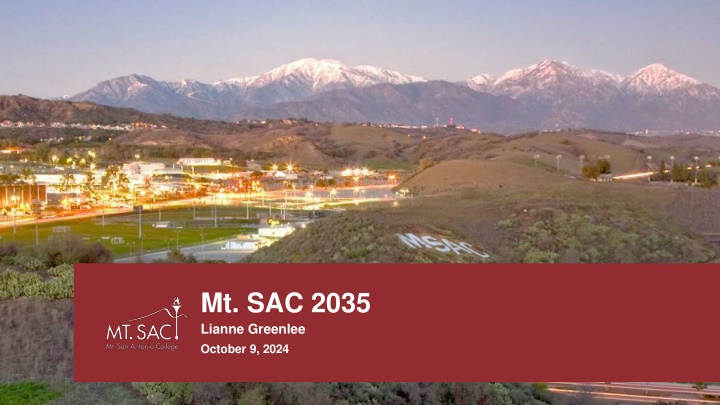

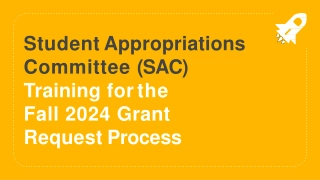
![Long-Range Wireless Charging Market Report & Analysis _ BIS Research [2024-2035]](/thumb/87166/long-range-wireless-charging-market-report-analysis-bis-research-2024-2035.jpg)
